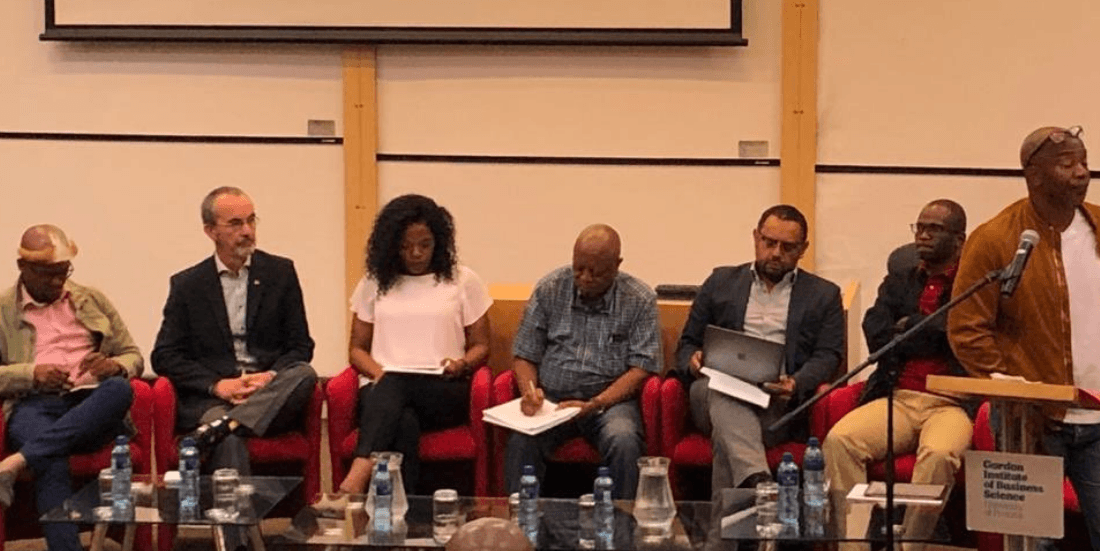MEDIA STATEMENT
For immediate release; 16 March 2020
Johannesburg
IT’S TIME FOR PRACTICAL SOE SOLUTIONS
Strategic Dialogue Group (SDG) and Public Affairs Research Institute (PARI) held a successful interactive dialogue session which emphasised a need to move public discourse towards practical solutions and actions that can rescue state owned entities (SOEs). Such interventions should ultimately ensure SOEs play their intended transformative roles in society.
An overriding theme emerging from the dialogue was that social compacting is inevitable if South Africa is to realise lasting solutions with benefits for communities. “We are joined at the hip, now let’s stop pulling in different directions as government, business, labour and civil society,” is the strong message emerging from the past weekend’s half-day dialogue.
The opening address was delivered by Deputy Minister of Finance, Dr David Masondo, followed by commentaries from a panel and an interactive dialogue with attendees. Panel members were:
- Popo Molefe, Chairperson of the Transnet Board;
- Zingiswa Losi, President of COSATU;
- Dipak Patel, Special Advisor to the Minister of Public Enterprises;
- Henk Langenhoven, Chief Economist at the Minerals Council; and
- Khaya Sithole, an independent analyst and academic.
SDG and PARI entered into a collaborative relationship aimed at improving public discourse about how to address South Africa’s poverty and inequality in the manner that current challenges are defined and addressed. Dialogue sessions such as this one are intended to guide the development of research papers, advocacy, submissions to strategic bodies and engagements in public platforms.
SDG is an organisation of progressive thought leaders and activists who champion progressive policies, build ethical leadership and mobilise constituencies for change in order to create an equitable and inclusive society. Founded in 2016, the SDG brings together former members of AZASO, NUSAS, SANSCO and SASCO whom it seeks to mobilise into active participants in rebuilding South Africa.
PARI studies the effectiveness of state institutions in the delivery of services and infrastructure. It generates high-quality research to better understand drivers of institutional performance in the public sector, improve implementation of policies in relevant fields, and promote informed and realistic solutions to the challenges of governance in South Africa.
During the dialogue it was recognised that progress has been made in turning around very dysfunctional and decimated institutions, but there are also some significant concerns that can be successfully addressed in the short term. These include addressing energy availability and getting governance right – including ensuring that SOEs are led by professional and competent board members as well as reduce political and board interference in operational decisions.
Other important areas of change and restructuring that were raised include:
- Clarifying the different roles of government as regulator and shareholder, particularly in the area of transport;
- Balancing technology changes with employment through ensuring a ‘just transition’. An example was given of encouraging the manufacture of solar panels in areas that previously produced coal; and
- Rationalising the over 700 SOEs according to a set of criteria which talks to the role that they can play towards socioeconomic transformation.
The panellists stressed that achieving what needs to be done requires social partners to both come together and hold each other accountable. Reference was made to the significance of the COSATU-proposed social compact to commit workers’ retirement and pension funds to address the debt burden facing Eskom as well as the role civil society has played and should continue to play to hold the state to account.
While acknowledging the historical challenges facing SOEs, focus was on what needs to be done. To forge a new path forward, having a common vision of a developmental state matters. A caution was however raised that, as South Africans, we should not be fixated with state ownership but should be willing to explore new models where the focus is on achieving outcomes that are in the public interest and which contribute meaningfully towards socioeconomic transformation.
In this regard, a strong and focused political centre committed to driving the country’s transformation agenda is critical and matters significantly. Reference was made to the origins of many SOEs during the first half of the 20th century, which were established as a job creation and poverty eradication strategy for poor Afrikaner communities. These were critical in serving unskilled whites who were no longer making a living on farms.
Also important is ethical and decisive leadership – making the right decisions and having the courage not to press the “enter button” for self-interest.
ENDS/
Issued by Strategic Dialogue Group (SDG) and Public Affairs Research Institute (PARI)
For Further Enquiries Or Comment Please Contact:
Dr Sihle Moon (Spokesperson) on 082 515 3618; OR
Florencia Belvedere on 082 515 8522


